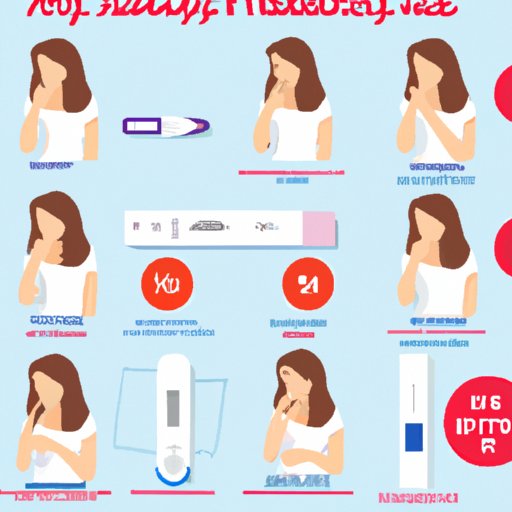Introduction
When it comes to pregnancy, one of the most common questions is: How long before you know you’re pregnant? While every woman’s experience is different, there are some common signs and symptoms of early pregnancy that can help you determine if you are expecting. This article will explore the different signs and symptoms of early pregnancy, how to recognize them, and the timeline for knowing you’re pregnant.

Exploring Different Signs and Symptoms of Early Pregnancy
The earliest sign of pregnancy is usually a missed period. However, other common physical symptoms may be present as early as two weeks after conception. These include fatigue, nausea, breast tenderness, frequent urination, and food cravings or aversions. Some women may also experience light spotting or implantation bleeding around this time.
In addition to physical symptoms, changes in mood or behavior can also be an indication of early pregnancy. These can include increased feelings of anxiety or stress, a sudden increase or decrease in appetite, and increased sensitivity to smells. Other possible signs of early pregnancy include headaches, backaches, and cramps.

How to Recognize Early Pregnancy Symptoms
If you think you may be pregnant, it is important to pay attention to any changes in your body. Keep a close eye on your menstrual cycle, noting when your period is late or unusually light. If you experience any of the common physical or behavioral signs of early pregnancy, it is a good idea to take a home pregnancy test.
The Timeline for Knowing You’re Pregnant
Implantation bleeding typically occurs 6-12 days after conception, when the fertilized egg attaches itself to the uterine wall. This can be an early indicator of pregnancy, but it is not always present. A home pregnancy test is the best way to confirm if you are pregnant. Most tests are accurate if taken after your period is late, which is usually 14 days after conception.
If you receive a positive result on a home pregnancy test, it is important to see a doctor as soon as possible. Your doctor can confirm the pregnancy and provide you with information about prenatal care and other resources.
Taking a Home Pregnancy Test: What to Expect
Home pregnancy tests work by detecting the presence of human chorionic gonadotropin (hCG) in your urine. This hormone is produced by the placenta shortly after the embryo implants itself in the uterus. Most tests are over 99% accurate if taken after your period is late. It is important to read the instructions carefully and follow all directions.
It is also important to understand that false-positive results can occur. This can happen if the test was done too early, or if certain medications or medical conditions affected the results. If you receive a positive result, it is important to see a doctor to confirm the pregnancy.
Conclusion
Knowing you’re pregnant can be an exciting and overwhelming experience. By understanding the common signs and symptoms of early pregnancy, you can better prepare yourself for what lies ahead. Paying attention to changes in your body, keeping track of your menstrual cycle, and taking a home pregnancy test are all great ways to determine if you are expecting. If the test is positive, it is important to make an appointment with your doctor to confirm the pregnancy.
(Note: Is this article not meeting your expectations? Do you have knowledge or insights to share? Unlock new opportunities and expand your reach by joining our authors team. Click Registration to join us and share your expertise with our readers.)
